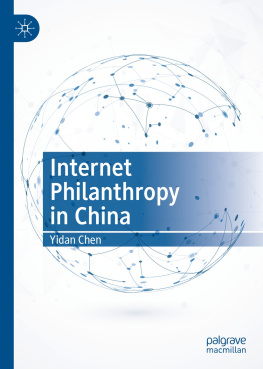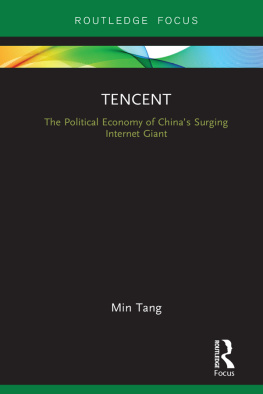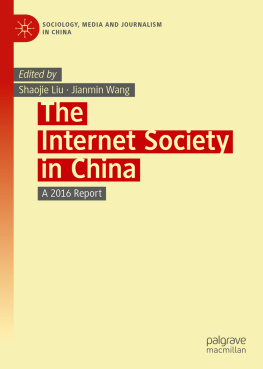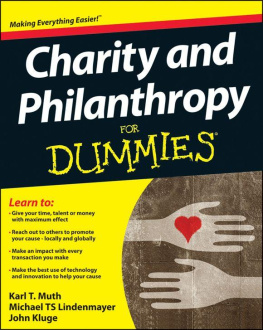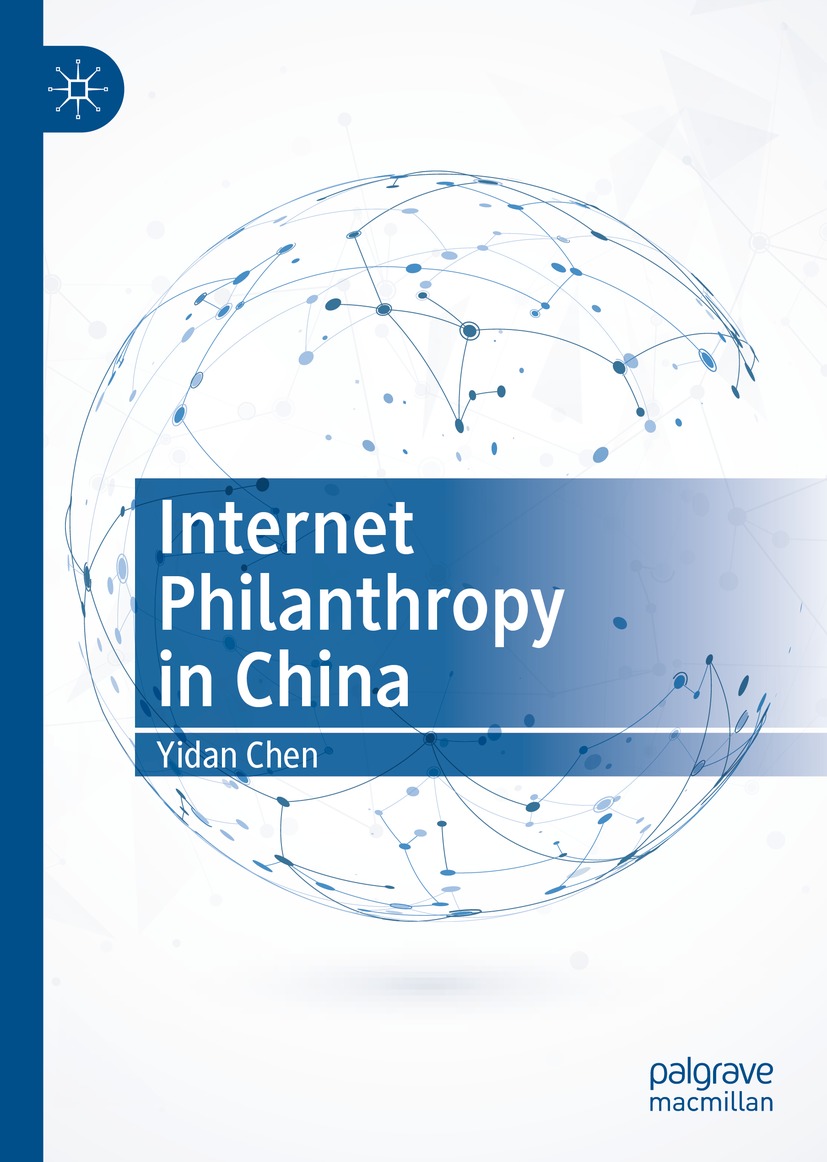Yidan Chen
Tencent Research Institute, Beijing, China
ISBN 978-981-16-2565-7 e-ISBN 978-981-16-2566-4
https://doi.org/10.1007/978-981-16-2566-4
Jointly published with China Renmin University Press.
The Editor(s) (if applicable) and The Author(s), under exclusive license to Springer Nature Singapore Pte Ltd. 2021
This work is subject to copyright. All rights are solely and exclusively licensed by the Publisher, whetherthe whole or part of the material is concerned, specifically the rights of translation, reprinting, reuse ofillustrations, recitation, broadcasting, reproduction on microfilms or in any other physical way, andtransmission or information storage and retrieval, electronic adaptation, computer software, or bysimilar or dissimilar methodology now known or hereafter developed.
The use of general descriptive names, registered names, trademarks, service marks, etc. in this publication does not imply, even in the absence of a specific statement, that such names are exempt from the relevant protective laws and regulations and therefore free for general use.
The publishers, the authors, and the editors are safe to assume that the advice and information in this book are believed to be true and accurate at the date of publication. Neither the publishers nor the authors or the editors give a warranty, express or implied, with respect to the material contained herein or for any errors or omissions that may have been made. The publisher remains neutral with regard to jurisdictional claims in published maps and institutional affiliations.
This Palgrave Macmillan imprint is published by the registered company Springer Nature Singapore Pte Ltd.
The registered company address is: 152 Beach Road, #21-01/04 Gateway East, Singapore 189721, Singapore
Preface
Two years ago, I had the idea of writing a book about the development of Internet philanthropy in China. Now, the idea has matured and it is time to share it.
Since I began working in Internet philanthropy 11 years ago, I have received sincere concern and valuable advice, though this has also been interspersed with a certain amount of turmoil. Ive witnessed the establishment of the Tencent Foundation , Chinas first Internet philanthropic foundation in 2007, and the 99 Charity Day event earlier this year, where more than RMB 1.414 billion was collected in donations from enterprises and foundations, then on top of this, 28 million individuals donated RMB 830 million in three days. Emerging technologies have revealed their explosive potential to the traditional, established philanthropy sector, shocking people from all walks of life. Such integration between philanthropy and the Internet has also been seen in the US, the UK and Japan. In the past few years, Internet philanthropy has undergone such drastic development that it deserves to be recorded and consolidated into one book.
I had three main objectives in writing this book.
Firstly, I want to document the many firsts that have occurred as part of this process, such as the first example of an email soliciting international aid, the first small-scale donation made via mobile payment, the first online aid provided to an individual, and the first regulations to be placed on Internet philanthropy . All of these have helped lay the fertile ground upon which Internet philanthropy could expand as it has. But of course, with growth comes growing pains. Far from unconditional support and praise, Internet users hold mixed views towards philanthropy. Some of the most acute criticisms and most influential negative news about philanthropy achieve their viral attention on the Internet. Therefore, it is worth documenting the ups and downs, the twists and turns that Internet philanthropy has gone through, as well as the people and events that have been influential along the way.
Second, the book aims to organize the countless lessons we can draw from over a decade of development in Internet philanthropy . For example, setting up a large-scale environment for Internet philanthropy is always somewhat slower than philanthropic practices on a micro scale. It was not until two years ago that Chinas Charity Law came into being, with provisions for Internet philanthropy . Furthermore, it takes a much shorter amount of time to mobilize masses of internet users than it does to develop regulations for public platforms. Without any motivation from users, regulations cannot make much headway. Moreover, as philanthropic projects gradually increase their level of transparency, sensationalism and blind obedience are giving way to rational thinking. It is high time we looked back at these universal lessons, so that we might find inspiration on how new technologies can be applied to other traditional industries.
Third, the book is designed to inspire us to renew our efforts. Some, though not always steady, progress has been made towards integrating philanthropy with the Internet. We have been on the right track and should not veer off course now. However, mobile phones and the Internet should not be alienating people. Internet philanthropy is something we can all benefit from. We must now look back to move forward, by mastering rather than being mastered by the Internet.
This book has been fully supported by the Tencent Research Institute and the Tencent Foundation .
The research team consisted of three of my friends, Wu Pengyang, Zhou Ziqi and Ma Tianjiao. They visited dozens of influential philanthropic organizations in China and abroad, where many of them witnessed stories that went viral online. Guo Kaitian, Chairman of the Tencent Foundation and the Tencent Research Institute, Si Xiao, Dean of the Tencent Research Institute, Zhai Hongxin, Secretary-General of the Tencent Foundation , Sun Yi, Deputy Secretary-General of the Tencent Foundation, and Li Gang, Director of the Research Center of the Tencent Research Institute, all offered constructive feedback to this manuscript. Researchers Liu Qiong, Sun Yi, and Xu Siyan also participated in the writing of this book. I would like to express my gratitude to all of them.
It took only a few months to write this book due to time restrictions. Any criticism, suggestions or corrections are welcome.
This book is dedicated to all those who have contributed towards the development of Internet Philanthropy in China.
Chen Yidan
Shenzhen, China
October 11, 2018
Prologue: A Painting Connecting You to Charity
Philanthropy begins where society pains.
Chen Yidan
Core Founder of Tencent, Initiator and Honorary Chairman of Tencent Foundation
Keynote Speech at the Kick-off Event of the First 99 Charity Day
September, 2015
In the minds of many Chinese people, the word philanthropy is both close to home and yet unfamiliar.
It feels close to home in the good deeds people carry out in their daily lives, no matter how small. It could be giving money to beggars on the street, which is the first image in Chinese peoples minds when they think about philanthropy . On the other hand, it is unfamiliar insofar as ordinary people not only dont know what philanthropy itself is, but they dont see how its relevant to them. In general, only CEOs and the extremely wealthy are seen as being able to make a difference through philanthropy , and everyone else, the ordinary people, might as well not try. Consequently, most donations in China come from enterprises, leaving the potential of the wider public untapped and undervalued. This is a stark contrast to the U.S. and other countries with highly-developed modern philanthropic systems.

